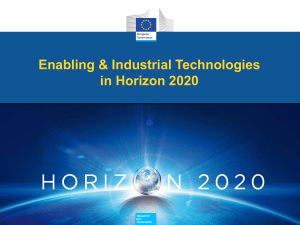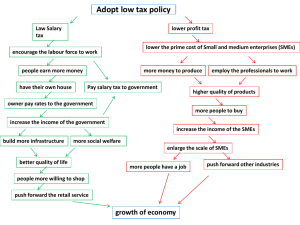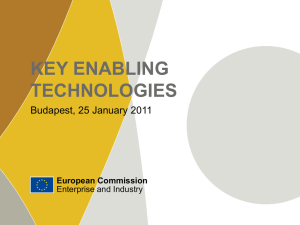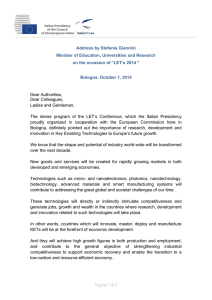What are the Key Enabling Technologies, the
advertisement
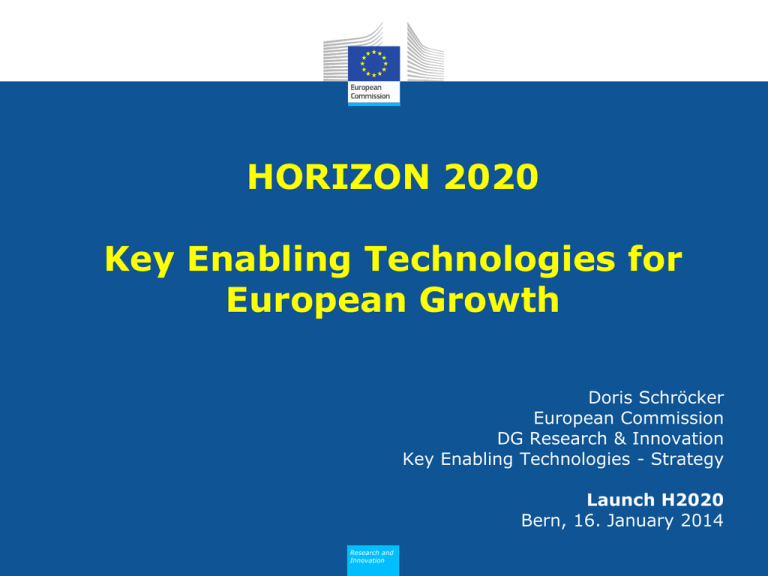
HORIZON 2020 Key Enabling Technologies for European Growth Doris Schröcker European Commission DG Research & Innovation Key Enabling Technologies - Strategy Launch H2020 Bern, 16. January 2014 Research and Innovation Horizon 2020 is different A strong challenge-based approach, allowing applicants to have considerable freedom to come up with innovative solutions Emphasis on innovation, with continuing support for R&D Less prescriptive topics, strong emphasis on expected impact A strategic approach, with two-year work programmes Focus areas bring together different technologies, along entire innovation chain Cross-cutting issues mainstreamed (e.g. social sciences, gender, international cooperation) 2 Policy Research and Innovation Horizon 2020 Total indicative budget: Excellent science European Research Council Future and EmergingTechnologies Marie Curie actions Industrial leadership Societal challenges Leadership in enabling and industrial technologies Health, demographic change and wellbeing Access to risk finance Food security, sustainable agriculture, marine and maritime research and the bioeconomy Innovation in SMEs Research infrastrutures Indicative Budget: 24.4 billion €* 77.0 billion €* Indicative Budget: 17.0 billion €* Secure, clean and efficient energy Smart, green and integrated transport Climate action, resource efficiency and raw materials * 2014-20, actual budget (indicative) Includes 5.9 billion € for "widening participaton", "science with and for society", JRC and EIT Policy Research and – not shown in three priorities above Innovation Inclusive, innovative and reflective societies Secure societies Indicative Budget: 29.7 billion €* Leadership in enabling and industrial technologies (LEIT) • Priority 1: Excellent Science • Priority 2: Industrial Leadership Leadership in enabling and industrial technologies (LEIT) (i) ICT including micro- and nano-electronics and photonics (ii) Nanotechnologies (iii) Advanced Materials This Work Programme (iv) Biotechnology (v) Advanced Manufacturing & Processing (vi) Space Access to risk finance Leveraging private finance and venture capital for R&I Innovation in SMEs Fostering all forms of innovation in all types of SMEs • Priority 3: Societal Challenges Policy Research and Innovation 4 Industrial Leadership Key Enabling Technologies (KETs) and partnership with industry, to recover from economic crisis • Emphasis on R&D and innovation with strong industrial dimension • Activities primarily developed through relevant industrial roadmaps (ETPs, PPPs) • Involvement of industrial participants and SMEs to maximise expected impact => key aspect of proposal evaluation • Funded projects will be outcome oriented, developing key technology building blocks and bringing them closer to the market 5 Policy Research and Innovation Mastering and industrial deployment of Key Enabling Technologies (KETs) What are KETs? • Six strategic technologies • Nanotechnologies • Advanced Materials • Driving competitiveness and growth opportunities • Micro- and nanoelectronics • Contributions to solving societal challenges • Biotechnology • Knowledge- and Capitalintensive • Cut across many sectors Policy Research and Innovation • Photonics • Advanced Manufacturing European KET Strategy: • EC Communications (2009)512 & (2012)341 • KET High-level Group 6 The issues regarding KETs • Europe has strong position in science and in patenting activity • EU actors are at top of patent ranking in each KET • But there is a gap between the technology base and the manufacturing base • We need to add demonstrators, competitive manufacturing and product development to the technologies From Lab to Industry to Market Policy Research and Innovation Main priorities for KETs Technology development and validation, aiming at industrial deployment of Key Enabling Technologies (KETs) Strategic research agendas, roadmaps and value chains (applications in several sectors) Industrial engagement / leverage Pilots and demonstrators Cross-cutting KETs (combinations of KETs and manufacturing), 30% of KET budget Enabling applications in societal challenges Policy Research and Innovation Example - combining several KETs for advanced products Societal Challenge Advanced materials Microelectronics Nanotechnologies Photonics New nanotechnologybased diagnostics New target drug delivery and release Biotechnologies Regenerative medecine Policy Research and Innovation Technology Readiness Levels (TRLs) – a useful tool in development and deployment of KETs NMP in FP7: TRLs 1 – 4; up to 5-6 in 2012-13 (pilots and demonstrators) LEIT KETs: TRLs 3/4 – 7; centre at TRLs 5-6 Policy Research and Innovation H2020 – LEIT/KETs: From R&D to close-tomarket activities • Use of Technology Readiness Levels (TRLs from 3-4 to 8) • Two funding rates Research and innovation actions: 100% funding: ~TRLs 3-6 Innovation actions: 70% funding: ~ TRLs 5-7 Non-profit participants can claim 100% funding • Cross-cutting KETs (combinations of KETs and manufacturing) • Seamless coverage provided by FETs/ERC – LEIT – Societal Challenges • Ground prepared in FP7 (first pilots and demonstrators, innovation activities) Policy Research and Innovation Public Private Partnerships (PPPs) • Industry plays leading role in defining research priorities • Pre-defined budget ensures continuity and commitment • Focused on enabling industrial technologies • Increased use of SME-friendly instruments and demonstration • Roadmaps prepared with large stakeholder involvement and public consultation • Concrete technological and sector related objectives – commitment from industry to reach them and to provide the necessary R&D+I investments • Fully open H2020 calls Policy Research and Innovation PPPs in H2020 Industrial Investment Package of 10 July 2013 : Joint Technology Initiatives (JTIs) implemented by Joint Undertakings Contractual PPPs (cPPPs) Public-Public Partnerships (P2Ps) PPPs in H2020 : Continuation of existing JTI's : Clean Sky, Innovative Medicines Initiative (IMI), Hydrogen and Fuel Cells (HFC) New JTI's : Joint Technology Initiative on Electronic Components and Systems for European Leadership (ECSEL), Bio-based industries (BBI) cPPPs (implemented within H2020 WP) Robotics Photonics Advanced 5G Network Infrastructures Factories of the Future (FoF) Energy-efficient Buildings (EeB) Sustainable Process Industry (SPIRE) European Green Vehicles Initiative High-performance Computing Policy Research and Innovation PPPs identified in the Specific Programme Industrial Investment Package of 10 July 2013 : JTIs/JUs contractual PPPs P2Ps For H2020 in LEIT: JTI: Joint Technology Initiative on Electronic Components and Systems for European Leadership (ECSEL) JTI on bio-based industries (BBI) Robotics Photonics Advanced 5G Network Infrastructures Factories of the Future (FoF) Energy-efficient Buildings (EeB) Sustainable Process industry (SPIRE) Policy Research and Innovation cPPPs Policy Issues in LEIT of relevance for proposals and projects Exploitation and business plans Industrial-size projects to look at additional funding/financing sources Contributions to solving societal challenges and to focus areas Open to International Cooperation Engagement with Social sciences and humanities Responsible approach to research and innovation Gender and diversity issues Policy Research and Innovation 15 H2020: Strong participation of SMEs • Integrated approach - around 20% of the total budget for societal challenges and LEITs to go to SMEs • Simplification of particular benefit to SMEs (e.g. single entry point) • A new SME instrument will be used across all societal challenges as well as for the LEITs • A dedicated activity for research-intensive SMEs in 'Innovation in SMEs' • 'Access to risk finance' will have a strong SME focus (debt and equity facility) Policy Research and Innovation Horizon 2020 SME instrument ? Procurement Concept & Feasibility Assessment IDEA Demonstration Market Replication Research Development Commercialisation business coaching throughout the project SME window EU financial facilities MARKET 18 Policy Research and Innovation Risk-Finance in H2020 RSFF: a successful instrument in FP7 to provide loans and guarantees supporting investments in RDI Part of the Horizon 2020 budget (3.7%) will be in the form of risk-sharing (for loans and guarantees) and risk finance (equity) Goal: Stimulate more investment in research and innovation, notably by the private sector - Leverage effect Building a bridge from R&D to Innovation: Effective and cost-efficient way to complement grant funding under Horizon 2020, national/regional programmes (including structural funds) and bring R&D results to the market 19 Policy Research and Innovation Risk-Finance in H2020 • Implemented by EIB and through partner banks Loan Finance Equity Finance • At least 1/3 for R&I-intensive SMEs and mid-caps through guarantees on loans • Complementary to the COSME Equity Facility for Growth investing in expansion and growth phases. • MoU between EC and EIB for improved access to finance for investments in KETs (signed on 27 February 2013) Policy Research and Innovation ERA-NETs – between H2020 and the national funding • In general smaller consortia (min 2 independent entities from 2 different MS or associated countries), smaller budgets, shorter duration, closer to market, more SMEs, and higher success rate compared to FP7 M-ERA.NET - materials science and engineering Manunet - new processes, adaptive manufacturing systems and the factory of the future SAF€RA – industrial safety WoodWisdom - wood material science and engineering INCOMERA – innovation and commercialisation in the NMP (launched in 2014) … • More information and call schedules: http://netwatch.jrc.ec.europa.eu/home 21 Policy Research and Innovation Synergies with Structural & Investment Funds (ESIF) • Increased funding for research and innovation available under regional funding • Smart Specialisation: strategic framework to access funding for Research and Innovation in Structural Funds 2014-2020 • National / regional authorities in charge (not the Commission) • Policy support measures to be undertaken timely (by the end of 2013) • Support from other EU, national or regional programmes encouraged (supported or not by ESIF) • Some topics particularly suitable for additional funding (e.g. to deploy technologies) Policy Research and Innovation How about synergies with Horizon2020? Upstream Downstream Horizon 2020 Frontier research (ERC, FET) ESI Funds Excellent R&I R&I Infrastructures and Equipment (IP1) Demonstration Pilots KETs PPPs prizes procurement ESFRI Skills ERA-Net, JP, EUREKA … Marie S. Curie Business Advisory services SME instrument, "Fast track" KICs "Stairway to Excellence" National/Region alR&I systems Capacity Building R&D "Research Excellence" Hopefully also excellence, but "Innovation Excellence" Innovation Market Policy Research and IP: Investment Priorities under the R&I thematic objective of the ERDF Regulation Innovation European Institute of Innovation and Technology (EIT) How does the EIT work? Integrating three sides of ‘knowledge triangle’: higher education, research and business: Knowledge and Innovation Communities (KICs) to promote innovation in Europe. Three KICs were launched in 2010: Climate-KIC: climate change mitigation and adaptation EIT ICT Labs: information and Communication Technologies KIC InnoEnergy: sustainable energy. EIT budget ~ EUR 2.7bn for 2014-2020. Five new KICs: Two in 2014: Innovation for healthy living and active ageing, Raw materials - sustainable exploration, extraction, processing, recycling and substitution Two in 2016: Food4Future - sustainable supply chain from resources to consumers; Added-value manufacturing One in 2018: Urban mobility http://eit.europa.eu/kics/ Policy Research and Innovation 24 TOPICS Nanotechnologies, Advanced Materials, Biotechnology and Advanced Manufacturing and Processing 25 Policy Research and Innovation 26 Policy Research and Innovation Work Programme topics •Structure reflects the challenge based approach •3 key features : • Specific Challenge o sets context, problem to be addressed, why intervention is necessary • Scope o delineates the problem, specifies the focus and the boundaries of the potential action BUT without overly describing specific approaches • Expected Impact o describe the key elements of what is expected to be achieved in relation to the specific challenge 27 Policy Research and Innovation Call for Nanotechnology, Advanced Materials and Production • Bridging the gap between nanotechnology research and markets Addresses 3 of key European nano-enabled industrial value chains : Lightweight multifunctional materials and sustainable composites Structures surfaces Functional fluids SMEs invited to participate Expected activities : Deployment and market introduction by scaling up lab experience to industrial scale and by demonstrating viability of variety of manufacturing technologies Attention: special evaluation sub-criteria Policy Research and Innovation Deadline 2014 call: 6 May Call for Nanotechnology, Advanced Materials and Production • Nanotechnology and Advanced Materials for more effective Healthcare Support more effective therapies in health care for important diseases. Required development : reach point where they can be considered fit for purpose in preparation of, but not including, clinical trial stages. Gender issues important : technologies and innovations should suit both women and men. Deadline 2014 call: 6 May for single stage and first stage, 7 Oct. for second stage (check topics) Policy Research and Innovation Call for Nanotechnology, Advanced Materials and Production • Nanotechnology and Advanced Materials for low-carbon energy technologies and Energy Efficiency Support EU objectives to increase use of renewable energy sources and improve energy efficiency Demonstrate technology readiness for further take-up by societal challenge Contributions to Materials Roadmap Enabling Low Carbon Energy Technologies Time to market should be assessed with view of contributing to EU2020 targets Deadline 2014 call: 6 May for first stage, 7 Oct. for second stage Policy Research and Innovation Call for Nanotechnology, Advanced Materials and Production • Exploiting the cross-sector potential of Nanotechnologies and Advanced materials to drive competitiveness and sustainability Boosting European industry competitiveness and contributing to a sustainable economy Enabling multi-sectorial potential, by developing and advancing technological readiness of solutions with break-through potential. International cooperation particularly appropriate. Deadline 2014 call: 6 May for first stage, 7 Oct. for second stage Policy Research and Innovation Call for Nanotechnology, Advanced Materials and Production • Safety of nanotechnology-based applications and support for the development of regulation Risk management to become integral part of supply chain All projects should align with the EU Nanosafety Cluster and other international activities International cooperation encouraged, in particular with leading nanotechnology developing Nations (US, Canada, Australia, Korea, Japan, China, Brazil) Responsible governance determining for future impact of nanotechnologies on society and economy (KET-support) Policy Research and Innovation Deadline 2014 call: 6 May for single stage and first stage, 7 Oct. for second stage (check topics) Call for Nanotechnology, Advanced Materials and Production • Addressing generic needs in support of governance, standards, models, and structuring in nanotechnology, advanced materials and advanced manufacturing and processing Addressing general, structural needs in areas incl. Infrastructure, metrology and standards, skills and networking, dissemination and communication, business models Other funding sources such as structural funds, are vital Proactive approach towards international collaboration Policy Research and Innovation Different deadlines – check topics Call for Biotechnology • Cutting-edge biotechnologies as future innovation drivers Synthetic biology : potential to influence or event transform large areas of our economy and society. Bioinformatics critical to realise full value of biotechnology Appropriate measures to facilitate effective transfer and implementation into new applications. Deadline 2014 call: 12 March for first stage, 26 June for second stage Policy Research and Innovation Call for Biotechnology • Biotechnology-based industrial processes driving competitiveness and sustainability Addresses technology driven R&D targeting industrial bottlenecks. Aim : maintain EU leadership in industrial biotechnology Deadline 2014 call: 12 March for first stage, 26 June for second stage Policy Research and Innovation Call for Biotechnology • Innovative and competitive platform technologies Furthering technological development of metagenomics technologies in terms of increased accuracy and costs reduction to expand their potential 2015 call Policy Research and Innovation Call for Factories of the Future (FoF PPP) Aim : help EU manufacturers (incl. SMEs) to adapt to global competitive pressures How : developing necessary key enabling technologies across broad range of sectors Meet increasing global consumer demand for greener, more customised and higher quality products Transition to demand-driven industry with lower waste and energy consumption Activities : Industry-led R&D projects (incl. Demo activities) Cross-sectoral, addressing needs of SMEs Attention: some topics have special evaluation sub-criteria Deadline 2014 call: 20 March Policy Research and Innovation Call for Energy-efficient Buildings (EeB PPP) Drive creation of high-tech building industry - Turning energy efficiency into sustainable business - Fostering EU competitiveness in construction sector on global level Reduce energy consumption & CO² emissions in existing and new buildings. Effective integration of key technologies into construction operations for sustainable, long-term competitiveness. Contributes to EU industrial leadership and grand societal challenges Participation of public authorities, asset for some projects as owners of large part of EU building stock. Deadline 2014 call: 20 March Policy Research and Innovation Call for Sustainable Process Industries (SPIRE PPP) Resource efficiency essential factor in industry General goal: optimise industrial processing, reducing energy & resources consumption, minimising waste Specific goals : reduction in fossil energy intensity of up to 30% from current levels by 2030. reduction of up to 20% in non-renewable, primary raw material intensity compared to current levels by 2030. reduction of greenhouse gas emissions by 20% below 1999 levels by 2020, further reductions up to 40% by 2030 and at least 80% by 2050. Attention: some topics have special evaluation sub-criteria Deadline 2014 call: 20 March Policy Research and Innovation SME instrument Accelerating the uptake of nanotechnologies, advanced materials or advanced manufacturing and processing technologies by SMEs SME-boosting biotechnology-based industrial processes driving competitiveness and sustainability Continuously open call 3 cut-off dates in 2014 Policy Research and Innovation • Find out more on Horizon 2020: • http://www.ec.europa.eu/research/horizon2020 • Participant Portal: • https://ec.europa.eu/research/participants/portal /page/home Please use the information given in the OJ and on the Participant Portal to prepare proposals. Thank you for your attention Policy Research and Innovation
